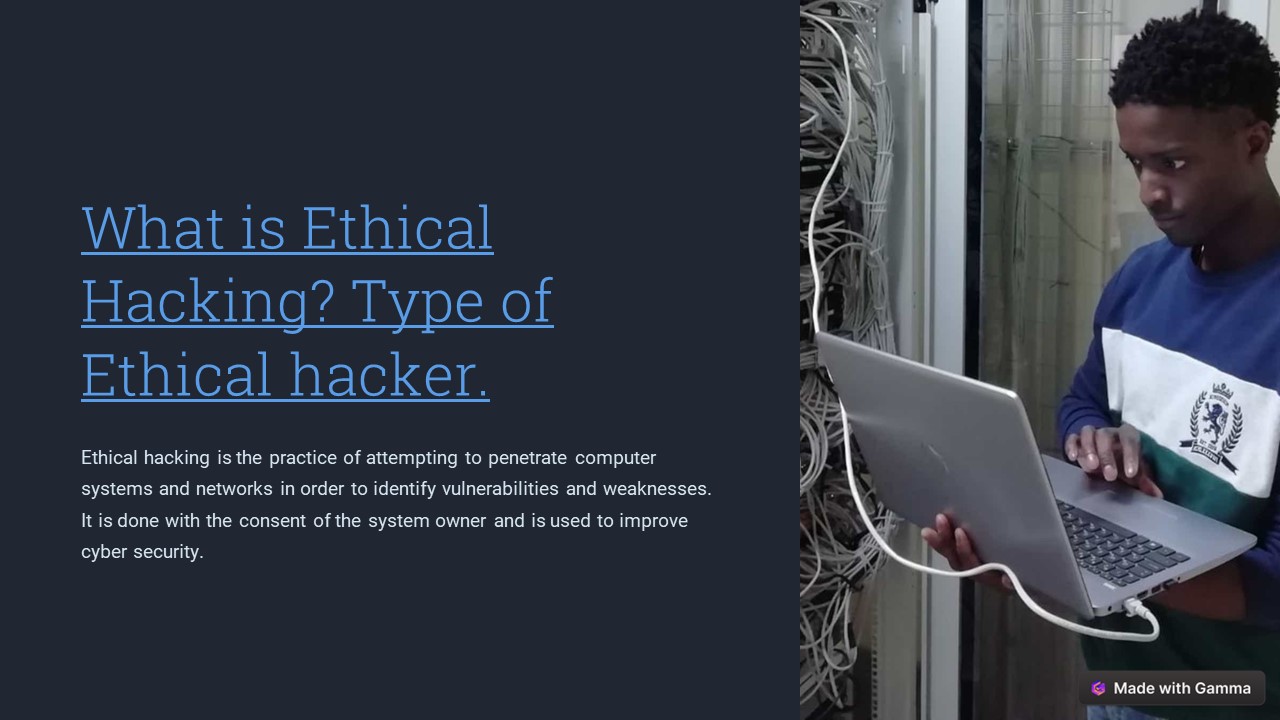What is Ethical Hacking? Types of Hackers. - PowerPoint PPT Presentation
Title:
What is Ethical Hacking? Types of Hackers.
Description:
Ethical hacking, also known as penetration testing or white hat hacking, refers to the practice of deliberately probing computer systems, networks, applications, and other digital resources to identify security vulnerabilities and weaknesses. The purpose of ethical hacking is to identify these vulnerabilities before malicious hackers can exploit them, thereby helping organizations enhance their overall cybersecurity and protect sensitive data. – PowerPoint PPT presentation
Number of Views:7
Title: What is Ethical Hacking? Types of Hackers.
1
What is Ethical Hacking? Type of Ethical hacker.
Ethical hacking is the practice of attempting to
penetrate computer systems and networks in order
to identify vulnerabilities and weaknesses. It is
done with the consent of the system owner and is
used to improve cyber security.
2
White Hat Hackers The Good Guys
Who are they?
How do they work?
What skills do they need?
White hat hackers are experts in computer
security who use their skills for defensive
purposes. They identify vulnerabilities and work
to patch them before malicious hackers can
exploit them.
They work in teams or independently to perform
penetration testing, vulnerability assessments,
and threat modeling to help organizations improve
their security posture.
They must have deep knowledge of computer
systems, networks, and security protocols. They
must also possess excellent problem-solving,
communication, and leadership skills.
3
Black Hat Hackers The Bad Guys
Who are they?
What do they do?
What motivates them?
Black hat hackers are criminals who use their
skills to breach computer systems and networks
for personal gain or to cause damage to their
targets.
They steal confidential information, install
malware and ransomware, deface websites, and
cause denial of service attacks. They exploit
known vulnerabilities or use social engineering
tactics to trick users into providing access to
their systems.
Money, power, revenge, and political or
ideological reasons can motivate black hat
hackers.
4
Grey Hat Hackers A Little Bit of Both
What do they do?
They hack into systems to identify
vulnerabilities and weaknesses, but they may go
beyond the scope of their agreement and access
data that they are not authorized to access.
1
2
3
Who are they?
Legal considerations
Grey hat hackers are people who use their hacking
skills to break into computer networks and
systems without malicious intent. They usually
have a strong ethical and moral compass and they
are not driven by financial gain or other
self-serving motives.
Grey hat hacking is a legal gray area. While they
do not have malicious intent, they can still be
prosecuted for accessing systems without
permission.
5
Hacktivists Hacking for a Cause
1
2
Who are they?
What do they do?
Hacktivists are hackers who use their skills to
promote a political or social cause. They might
attack government websites, corporations, or
other entities that they perceive to be guilty of
wrongdoing.
They might deface a website, leak confidential
information, disrupt services, or perform other
acts of digital activism. They often act as a
form of non-violent protest against policies or
actions that they oppose.
3
Are they legal?
Hacktivism is not always legal, and depending on
the actions taken, hacktivists may face criminal
charges.
6
Script Kiddies The Amateur Hackers
Who are they?
Why do they do it?
What are the risks?
Script kiddies are amateur hackers who use
pre-written scripts or tools that require little
technical knowledge to execute. They might
download tools from the internet and use them to
launch basic attacks on vulnerable systems.
Script kiddies might hack for fun, curiosity, or
to impress their peers. They are often motivated
more by the thrill of the hack than by any
specific goals or ideology.
Script kiddies might expose themselves to legal
risk, as many of the tools they use are illegal.
They might also inadvertently cause damage to the
systems they are trying to hack.
7
Conclusion The Importance of Ethical Hacking in
Cybersecurity
1
Why do we need ethical hacking?
Ethical hacking can help identify vulnerabilities
and weaknesses in computer systems and networks
before malicious hackers can exploit them. This
can prevent data breaches, financial losses, and
damage to an organization's reputation.
2
What are the benefits?
By prioritizing cybersecurity and investing in
ethical hacking, organizations can prevent cyber
attacks, protect their customers' data, and avoid
legal liability.
3
What are the challenges?
There is a shortage of skilled ethical hackers,
and the costs of hiring or training them can be
high. Organizations must also balance the need
for security with the need for usability and ease
of use for their employees and customers.
8
Thanks for Watching!!































